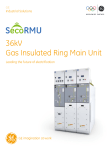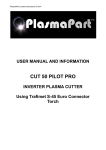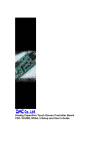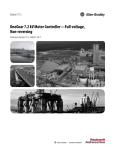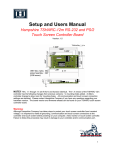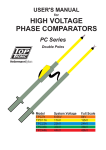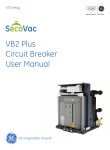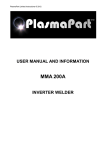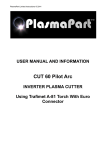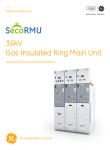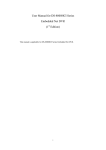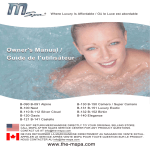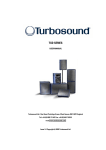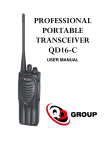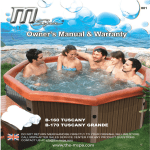Download 24kV-27kV Air Insulation Switchgear
Transcript
GE Industrial Solutions Gear 24kV-27kV Air Insulation Switchgear User Manual Index General 2 Summary 2 Standard and Specification 2 Operating Conditions 3 Safety and Environment Protection Requirement 3 Handling and Storage 4 Installation of Switchgear 6 Technical Specification 7 Technical specification for SecoGear Table 1 7 Technical specification for SecoVac VB2 Plus (Circuit breaker) Table 2 7 Main circuit resistance of SecoVac VB2 plus Table 3 7 Technical specification for Earthing switch Table 4 8 Resistance to internal arc faults (Optional) 8 Keylock (Optional) 8 Padlock (Optional) 10 Enclosure design and equipment 11 Typical Modules (Figures 3/1) 11 Enclosure and Partitioning (Figure 3/2) 11 Switchgear Structure 12 Cable Connections 15 Operations and trouble shooting 16 Operations and trouble shooting 16 Rack Circuit Breaker out from Service Position to Test / Disconnected Position 17 Circuit Breaker 18 Earthing Switch Operation 18 Interlocking of the Switchgear 19 Debugging of Combined Overcurrent Relay 20 Inspection and Maintenance 21 Summary 21 Inspection and Maintenance Interval 21 Diagnosis and Trouble Shooting for Malfunction During Operations 22 Maintenance Item and Cycle 22 Routine Inspection 22 Service 23 Repairs 24 Inspection Items 24 Performance Test 24 Major Repairs and Examples 25 Inspection and replacement of the main busbar 25 Inspection and replacement of the fixed contact and spout bushing 26 Inspection and replacement of the shutter mechanism 27 Replacing the earthing switch 27 Replacing the current transformer 29 Inspection and replacement of the surge arrester 30 Main Busbar 31 Spare Parts 32 Appendix A - Onsite Service Safety Instruction 32 SecoGear 24kV-27kV Air Insulation Switchgear Safety first! Important Recommendations: • Switchgear should be installed in a clean, dry, ventilated room. • Switchgear and/or switchboards should be installed in closed rooms suitable for electrical equipment. • Installation, operation and maintenance should be carried out by licensed electricians. • Fully comply with the applicable standards (e.g. IEC), the utility connection requirements and the applicable safety regulations. • Observe the relevant instructions in the instruction manual for all actions in relation to switchgear and switchboards. warning symbol. • Pay attention to the hazard notes in the instruction manual marked with this • Make sure that the specified data are not exceeded under switchgear or switchboard operating conditions. • Keep the instruction manual accessible to all personnel involved in installation, operation and maintenance. • The users must act responsibly in all matters affecting safety at work and correct handling of the switchgear. Warning • Always follow the instruction manual and respect the rules for good engineering practice! • Hazardous voltage can cause electrical shocks and burns. • Disconnect power, then earth and short-circuit before proceeding with any work on the equipment. If you have any further questions about this instruction manual, our field team will be pleased to provide the required information. GE Energy reserve all rights to this publication. We do not accept any responsibility for the information provided, which is subject to alternation. 1 SecoGear 24kV-27kV Air Insulation Switchgear General Summary This publication contains the information required for switchgear, such as the technical data, detailed part lists for the installation, commissioning, operation and maintenance individual panels and comprehensive circuit documentation etc., of SecoGear. SecoGear is three-phase, metal enclosed, air- can be found in the relevant order documents. insulated factory assembled switchgear. SecoGear is typetested and suitable for indoor applications up to 27 kV. The For correct usage of the switchgear, please read this manual panel is designed with withdrawable modules and is fitted with carefully. It is always advisable to use the manual for all a single busbar system. The withdrawable parts are equipped operations regarding installation, commissioning, operation and with circuit breakers, voltage transformers, fuses or current maintenance of SecoGear air-insulated switchgear. transformers. These instructions are also used as references for personnel to Details of the technical design and configuration of individual carry on regularly maintenance of the switchgear. Standard and Specification • SecoGear complies with the standards and specifications for factory-assembled, metal enclosed and type tested high voltage switchgears to IEC publications as given below. IEC62271-100: 2008 …………… High-voltage alternating current circuit breakers. IEC62271-200: 2003 …………… AC Metal enclosed switchgear and control gear for rated voltages above 1kV and up to 52kV. IEC62271-102: 2001 …………… High-voltage alternating current Disconnector and Earthing Switches. IEC62271-1: 2007 …………… The common specification for high voltage switchgear and control gear simple Standards IEC60529:1989 …………… Degrees of protection as provided by enclosures (IP Code) The switchgear has the following degrees of protection: IP 4X applies for the enclosure and IP 2X applies for the partitions. All other corresponding IEC publications, national or local safety regulations must be followed during the installation and operation of the switchgear. In addition, any project specific advice from GE must be considered. 2 SecoGear 24kV-27kV Air Insulation Switchgear Operating Conditions Normal operating conditions The switchgear is fundamentally designed for the normal service conditions for indoor switchgear to IEC Publication 62271-1:2007. The following limitations apply. (If there are others we should detailthe limitations) • Ambient temperature - Maximum + 40℃ - 24h-Medium +35℃ - Minimum -15℃ • The maximum site altitude is 1000 m above sea level • Humidity - Highest average value measured over 24 hours o Relative humidity 95 % - Highest average value measured over 1 month o Relative humidity 90 % • The intensity of earthquake should not exceed level 8 Special operating conditions Note on any special climatic operating conditions SecoGear is suitable for operation in the climate of indoor When the switchgear is operated in areas with high humidity type according to IEC 62271-200 standard. Special operating and/or major rapid temperature fluctuations, there is a risk conditions must be discussed with the manufacturer in advance. of condensation. Preventive actions (e.g. applying an electric For example: At site altitudes above 1000 m, the effects of the heater) must be consulted with the manufacturer to avoid reduction in density of air on the dielectric properties must be condensation and any resulting corrosion or other adverse taken into account. effects. The control of the heaters depends on the particular Increased ambient temperatures must be compensated for in project are available. the design of the busbar and the branch conductors as well as the withdrawable parts; otherwise the current carrying capacity will be reduced. Fitting additional ventilation facilities can assist heat dissipation in the switchgear panel. Safety and Environment Protection Requirement Safety Procedure • Wear safety uniform according to electric safety regulations before entering the site • Comply with industry work procedure. Power supply shall be operated by authorized staff. Environment protection requirements The manufacturer has a product recycle policy in accordance with related law and ISO14001. Local laws shall be observed when the switchgear is due for recycle. 3 SecoGear 24kV-27kV Air Insulation Switchgear Handling and Storage Condition on delivery Transport At the time of dispatch, the factory assembled SecoGear will The transport units normally comprise of individual panels and, have withdrawable parts either securely locked in the service in exceptional cases, small groups of panels. The panels are position or packed separately, depending on the rating of the equipped with four (4) lifting eyebolts. equipment, transport mode and destination. Only carry out loading operations when all precautionary The SecoGear panels are verified in the factory for completeness measures to protect personnel and materials have been taken, as per order requirement, and also passed routine testing as per with the following equipment: IEC 62271-200. The busbars are not assembled, they are packed separately with fasteners and accessories. • Crane of suitable capacity; the minimum capacity shall be 2 tonnes • Fork-lift truck and/or manual trolley • Lifting ropes/slings of appropriate load capacity with shackles Packing Based on the kind of transportation and country of destination, • Maintain an angle of at least 60° from the front for the ropes leading to the crane hook (Figure 1/1) the packing may vary. To protect against moisture a drying agent bag is provided. IEC62271-1:2007 guidelines are followed. HANG THE UNITS USING ALL 4 EYEBOLTS! • Panels with basic or no packing • Panels with seaworthy or similar packing (including packing for containerized shipments) o Sealed in polyethylene sheeting o Transport drying agent bags included o Moisture indicator included • Observe the directions for use of the drying agent bags. Note the following o Drying agent color observed blue indicates the packaged equipment is dry condition o Drying agent color observed pink indicates the packaging contains moisture (relative humidity above 40%). Please Figure 1/1: Handling by crane contact the manufacturer in this case before installation (1) Lifting eyebolts (qty.4) 4 SecoGear 24kV-27kV Air Insulation Switchgear Upon Receipt The responsibilities of the consignee when the switchgear arrives at the site include, but are not limited to, the following: Check the consignment is complete and without damage (e.g. look for any adverse effect caused by moisture). In case of doubt, the packing must be opened and then properly resealed with new drying agent bags (when intermediate storage is necessary). If any quantities are short, or defects or transport damage is noted, these must be; • Documented on the respective shipping document • Notified to the relevant carrier or forwarding agent immediately in accordance with the relative liability regulations Note: Always take photographs to document any major damage. Intermediate storage Intermediate storage should follow the following practices to avoid any negative consequences: Panels with basic packing or without packing Panels with seaworthy or similar packing with internal protective • A dry well-ventilated storeroom with a climate in accordance covers with IEC62271-1:2007 • Store the transport units • Store the panels upright a. Protected from the weather • Do not stack panels b. In a dry place Panels with basic packing; c. Safe from any damage • Open the packing, at least partially • Check the packing for damage Panels without packing; • Check the drying agent; • Loosely covered with polythene d. On arrival of the consignment • Ensure that there is sufficient air circulation e. Subsequently at regular intervals Check regularly for any condensation during storage. When the maximum storage period (starting from the date of packing) has been exceeded • The protective function of the packing can no longer be guaranteed • Take suitable action if intermediate storage needs to be continued Warning Do not walk on the top of the panels (due to rupture points in pressure relief devices) ! The pressure relief devices can be damaged! 5 SecoGear 24kV-27kV Air Insulation Switchgear Installation of Switchgear Basic Frame In order to obtain an optimum installation sequence and ensure 800 600 personnel and monitored by responsible persons. 1800 1700 800/1000 only be carried out by specially trained, or at least by supervised 1800 1700 800/1000 high quality standards, site installation of the switchgear should Basic Frame Switch room cable duct arrangement (Side elevation) Power Cable Duct must be fundamentally finished, provided with lighting and the electricity supply, lockable, dry and with facilities for ventilation. Power Cable Duct On commencement of installation on site, the switch-room It is also required that the basic frame and indoor ground for the switchgear should be checked and accepted before the construction. It must be ensure that the ceiling height is sufficient for the opening travel of the pressure relief plates. 800 30 Tolerances for laying the floor frame are: 1800 70 800 1800 30 150 70 150 Evenness tolerance: ± 1mm within a measuring length of 1m. Straightness tolerance: 1mm per 1m, but not more than 3mm over entire length of frame. Cross section view of switchgear room layout (plan view) Connection betweenSwitchgears In order to connect the different switchgears together, here use bolts of M8×35 to connect the panels together, the torque requirement for the bolts is 26 N∙m, the connection points on the 1900 1800 70 switchgear is shown below. 2400 800 30 Top Curface of basic frame 3~5mm above ground Basic Frame 140 130 +5.0m 300 250 1200 Strap of control cable duct Figured steel plate (t=5mm) Control Cable Duct 250*250 800 290 v 800 Power Cable Duct 800*1000 Detail of switchgear cable access cutout 1800 1700 Connection Points betweenSwitchgears 54 A B 4-15x20 144 358 190 130 Power Cable Control Cable Width A B C Dimension 800 600 595 1000 800 692 6 SecoGear 24kV-27kV Air Insulation Switchgear Technical Specification Technical specification for SecoGear -Table 1 Rated voltage kV 24 27 Rated power frequency withstand voltage kV 50 65 Rated lightning impulse withstand voltage kVp 125 Rated frequency Hz 50/60 Rated current A 1250/2500 Rated short time withstand current(3s) kA 31.5 Rated peak withstand current1) kAp Resistance 82 ≤ 110 ( ≤ 1600A) uΩ IP level for weather protection 125 ≤ 85 ( ≥ 2000A) Enclosure IP4X Between compartment IP2X Technical specification for SecoVac VB2 Plus (Circuit breaker) -Table 2 Rated voltage kV 24 27 Rated power frequency withstand voltage kV 50 65 Rated lightning impulse withstand voltage kVp 125 Rated frequency Hz 50/60 Rated current A 1250/2500 Rated short-circuit breaking current: kA 125 31.5s Percentage of DC component Up to 52% Rated short-circuit closing current kAp 82 Rated short time withstand current kA 31.5 Rated peak value withstand current kAp 82 Rated duration time for short-circuit s 3 Opening Time ms 20 ~ 50 Closing Time ms 30 ~ 70 V 24*/30*/36/48/60/110/220 V DC 110/220 V AC Rated auxiliary control voltage Operation sequence: O-0.3s-CO-15s-CO/ O-0.3s-CO-180s-CO Mechanical life operations: Times Electrical Endurance Class E2 A 400 Single Capacitor Switching current 10000 (M 2) *Consult with GE Main circuit resistance of SecoVac VB2 plus -Table 3 7 Item Unit Rated current A 1250 Value 2500 Withdrawable µΩ ≤ 45 ≤ 25 SecoGear 24kV-27kV Air Insulation Switchgear Technical specification for Earthing switch -Table 4 S/N Specification Unit Data 1 Rated voltage kV 24/27 2 Rated Work frequency withstand voltage (1min) in open condition of switch kV 65 3 Rated Lighting impulse withstand voltage (peak value) in open condition of switch kVp 125 4 Rated short-time withstand current (3s) kA 31.5 5 Rated peak value withstand current kAp 82 6 Rated short circuit making current kAp 82 7 Centre distance between phases mm 220/255 8 Electric endurance Class E1 9 Mechanical endurance Times 2000 Resistance to internal arc faults Arc release All three primary compartments of SecoGear switchgear are 31.5kA/1s provided with pressure relief flaps, which will automatically open and guide the pressurized gas to the rear side direction if an internal arc fault occurs in an affected compartment The pressure relief protects damage to switchgear components and the risk of injury to personnel, which may endanger an operator or extend the arc fault effect to the entire switchgear lineup. The relief flap is fixed by 3-M8 steel bolts and the other side is fixed by plastic M6 screw, The M6 screw will be broken and flap will open along weakness area( No bend area and part with oblong holes) when pressure increase quick by internal arc Keylock (Optional) The use of key interlocks is to realizing the interlocking logics between units of switchgear, Also the functional truck can be locked in the racked-out position and the relevant lock key can only be removed with the functional truck in disconnect position. The earthing switch closing and opening operations can be locked by means of keys. The latter can only be removed with the earthing switch in an opposed position to the lock to be made. 8 SecoGear 24kV-27kV Air Insulation Switchgear Description of the interlock system Functional truck racking-in lock Earthing switch closing lock Earthing switch opening lock Key Condition Key will be free when the truck in the disconnect position Key will be trapped when the truck in the rack-in position Key will be free when the Earthing switch is open Key will trapped when the earthing switch in closed position Key will be free when the Earthing switch closed Key will trapped when the earthing switch in open position Figure : Functional truck racking-in lock Key lock is locked, key is free, Truck indisconnect position Key lock can't be locked when truck in rack in position, and key is trapped Figure 2/5: Earthing switch in open position When earthing switch in open position, earthing switch can be locked by closing lock, the key of closing lock can be free. And opening lock can't be locked, the key of opening lock is trapped. Figure 2/6: Earthing switch in close position When earthing switch in close position, earthing switch can be locked by opening lock, the key of opening lock can be free. And closing 9 lock can’t be locked, the key of closing lock is trapped. SecoGear 24kV-27kV Air Insulation Switchgear Padlock (Optional) Padlock for Circuit breaker racking-in/out operation Padlock for Circuit breaker racking-in/out operation will limit the access to insert crank lever to racking-in/out Circuit breaker. Rackingin/out operation can be done only when lock cover is in the open position. Figure 2/9: Padlock for Circuit breaker racking-in/out operation Padlock for earthing switch operation Padlock for earthing switch operation will limit the access to inserting the operation lever to operate earthing switch. Open/close button can be operated only when the lock cover is in the open position. Figure 2/8: Padlock for earthing switch operation 10 SecoGear 24kV-27kV Air Insulation Switchgear Enclosure design and equipment Typical modules (Figures 3/1) With withdrawable type SecoVac VB2 Plus Vacuum Circuit Breaker installed, SecoGear panels are used for incoming or outgoing feeder. Each unit consists of three high voltage compartments; Main bus bar, Circuit breaker, Cable compartment and one Low voltage compartment for instruments and auxiliary circuits. For busbar sectionalizing, two panels are necessary, the coupling panel with the withdrawable circuit breaker part and a bus riser panel (available with busbar metering and earthing). In equipment without busbar sectionalizing, a direct bar connection between the individual panels will be provided. Figure 3/1: Typical modules Enclosure and partitioning High quality 2mm thick Alu-Zinc steel sheets is used for the • Figures of the panel (Refer to figure 3/2), the floor of the cable external enclosure and internal partitions. Pressure relief compartment is fitted with removable non-magnetic metal flaps are provided on the top of the panel for all high voltage (13). compartments. In case of overpressure due to internal arc • The rear wall of the busbar compartment (3), intermediate inside any of the compartments, these pressure relief flaps are wall (14), mounting plate with shutters (16) and horizontal designed to open quickly to release the pressure. The pressure- partition (20) form part of the internal partitioning. relief flaps are secured with steel screws on one side and • The earthed internal partitioning ensures safe access to the with plastic screws on the other side. In the case of internal circuit breaker and cable compartment (C) even when the overpressure, the plastic screws are the point of rupture caused busbars are energized. by arc conditions. The top mounted pressure relief flaps on the enclosure are made from mesh metal. All compartments are accessible from the front, with their • The low voltage compartment (D) is fully protected from the high voltage area with the earthed steel-sheet casing. • On the end sides of the switchgear, end cover plates are own independent doors. The front doors can be opened up to provided for consistent appearance, as well as mechanical an angle of 130° and they are arc resistant. An inspection and thermal strength in case of internal arc fault in the end window made of security glass is provided on circuit breaker panel. compartment door. The panel design provides an air gap between two adjacent panels after panels are joined together. • Doors, rear walls and cover plates are treated against corrosion and then coated with high quality paint. The doors for circuit breaker and cable compartment are arc resistant with a mechanical interlock. 11 SecoGear 24kV-27kV Air Insulation Switchgear Switchgear structure 1 P30 P32 1. Pressure relief plate 12 2. Enclosure 3. Cover of main busbar compartment (can be removed) 5 2 4. Branch busbar D A 5. Main busbar 3 B 4 6 7 15 6. Primary disconnect spouse 14 7. Primary disconnect 16 8. Current transformer 9. Earthing switch 8 17 18 40 9 22 10 17 11. Bottom plate 12. Partition between breaker compartment and busbar 13 C 10. Rear door interlock 19 compartment 13. Terminal block 14. Control plug 11 20 15. Shutter Figure 3/2: Typical feeder panel 16. Vacuum circuit breaker A. Main bus compartment 17. Drive screw B. Breaker compartment 18. Earthing switch operation mechanism C. Cable compartment 19. Control wire duct D. Low voltage compartment 20. Main earthing busbar 10 SCALE Figure 3/3: Incoming/feeder panel(1250/2500A) 1,000 Figure 3/4: Incoming With fix VT panel (1250/2500A) 12 SecoGear 24kV-27kV Air Insulation Switchgear 01 A A B B C C SCALE SCALE 1,000 1,000 Figure 3/5: Busbar tie panel(1250/2500A) Figure 3/6: Riser panel(1250/2500A) JSZV17-15R JSZV17-15R 15 76 76 95.5 95.5 15 01 Figure 3/7: Measuring panel(1250/2500A) 13 Figure 3/8: VT Panel (2500A) SecoGear 24kV-27kV Air Insulation Switchgear Figure 3/9: Incoming with ES & VT panel (1250/2500A) Figure 3/10: Riser with ES panel (1250/2500) Figure 3/11: CPT panel (2500A) Figure 3/12: Typical dimensions and Weights of SecoGear (including withdrawable circuit-breaker parts) Dimension in mm Description 27kV Height A Rated current of branch 1250A 31.5kA Width VT 800 Weight A Kg 1250 800-1000 2500 1000-1200 B Rated current of branch 2500A 31.5kA Depth 2400 Rated current 1000 C 1800 14 SecoGear 24kV-27kV Air Insulation Switchgear Cable Connections The cable compartment contains current transformers, voltage transformers (fixed or withdrawable), and earthing switch, depending on the individual operating requirements. The cable compartment is constructed for installation of three current transformers. When all the three current transformers are not required, dummies can be installed in their place to maintain the same installation and connection procedures. The fixed or withdrawable voltage transformers are connected with busbar on the primary side and fitted with HRC fuses. The earthing switch can be operated manually, with position indication by mechanical indicator on the driveshaft and auxiliary switch. Three lightning arrestors (optional) can be mounted in the space available. Cable connection: Rated voltage Panel width Max. number of parallel cables Max. cross section of cables Range of cable clamp Range of reducer ring (kV) (mm ) per Phase (mm2) (mm) (mm) 630 35-54 27-62 27 800 6 1000 6 4 3 NO. Parts Description 1 Cable clamp 2 Main earthing bar 3 Cable connection bar 4 Earthing Switch 2 1 Figure 3/13: Cable compartment layout 15 This cover has been interlocked with the earthing switch and can be opened only when the earthing switch is in closed position Earthing switch can be opened only when rear cover is closed SecoGear 24kV-27kV Air Insulation Switchgear Operations and trouble shooting Operations and trouble shooting Before start up, the following work should be completed: a. Check the overall condition of the switchgear and clear any potential risk factor. h. Remove the shipping cap on the pole of the circuit breaker. i. When testing the power frequency withstand voltage of main b. Check the switch,truck,isolated contactor and insulating parts etc. by visual inspection. circuit, pay particular attention to sensors, cables and other equipment during the test process. c. Check the connection between earthing bus bar and Attention: Read the product manual carefully when testing earthing conductor of the transformer substation outside the the VT withstand voltage; use a test voltage of appropriate compartment is secure. frequency to avoid core saturation. d. Remove all of the remaining materials, unnecessary objects and tools inside of the compartment. j. Place the Circuit Breaker on auxiliary control power. k. Perform the operation test of the circuit breaker by manual or e. Wipe the compartment body and the insulation parts with electric control; observe the corresponding position indicator. a soft cloth that should be clean and dry. Then wipe off any l. Check the interlocking validity, both mechanical and electrical. remaining dust and grease. m.Conductive paste can be applied on the circuit breaker f. Clean the surface of earthing busbar. The earthing loop primary contacts. resistance should be less than 350 micro-ohms. g. Re-install the cover removed during the period of installation, wiring and commissioning. Warning a. Comply with all relevant safety regulations b. Maintain circuit breakers in disconnection position c. Remove earth wires and short wires of the hazardous areas d. Pay attention to any abnormal situations Use of hand tools 1) Gear door lock key 2) Rack handle for truck 3) Earthing switch operation handle drawing no: 5GD.253.008 drawing no: Y-002 drawing no: 5GD.253.144 FIG 20 : Hand Tools 16 SecoGear 24kV-27kV Air Insulation Switchgear Rack Circuit Breaker out from service position to test / disconnected position Move circuit breaker truck from transfer truck into the switchgear a. Check the fixed primary contact and apply an adequate amount of conductive paste. Check the interlocking Warning mechanism and apply lubricant on the moving parts to ensure The trolley has four (4) nuts for adjusting the platform, to smooth operation. the same level of the breaker compartment. b. Place the Circuit Breaker on transfer truck and put in lock position. (See figure 4/1). d. Push the two sliding cranks inward under the truck to remove the locked position with the transfer truck, and then push the truck forward to make it enter the switchgear compartment VCB locked on and lock it in the disconnect / test position. (See figure 4/4). the transfer truck e. Operate the lock key releasing lever of the transfer truck to Figure 4/1: VCB truck on the transfer truck c. Move the transfer truck to the front of the switchgear, turn the adjusting nut to adjust the height of the transfer truck platform, (See figure 4/2). Aim the guiding pin at the guiding Figure 4/4: Lock VCB in switchgear jack in front of the switchgear, push and make the transfer truck engage with the switchgear by using the lock key. At remove the locked relation between the transfer truck and the the same time, insert the front guide rail of the transfer truck switchgear, and then remove the transfer truck. into the bottom guide rail groove of the switchgear truck. (See figure 4/3). 17 Figure 4/2: Transfer truck lock Figure 4/3: Lock VCB in with switchgear switchgear SecoGear 24kV-27kV Air Insulation Switchgear Move the truck from disconnect / test position to service position a. Make sure the front and back door of the switchgear are closed. Make sure the earthing switch is in the open position, Warning the circuit breaker compartment is clear and without any The truck is not allowed to be placed in any intermediate unexpected object. position between disconnect/test position and operating position. b. Insert the secondary plug of the truck into the socket on the topside of the switchgear truck compartment and put into the lock position. (See figure 4/5 & 4/6) Move the Circuit Breaker from service position to test position a. Make sure the circuit breaker is in open position. b. Perform the operating steps for moving the Circuit Breaker into operation position in reverse order. Figure 4/5: Take off secondary plug from truck Move the Circuit Breaker from switchgear compartment to transfer truck. Perform the operating steps for moving the Circuit Breaker truck from transfer truck into the switchgear in reverse order. Figure 4/6: Put the secondary plug into switchgear socket c. Make sure the circuit breaker is in the open position. d. Insert the racking crank of the truck into the rectangular cranking hole of the screw mechanism of the truck through the operation hole under the door of the circuit breaker compartment. (See figure 4/7). Circuit breaker For operating instructions refer to the Circuit Breaker instruction manual. Earthing switch operation The earthing switch has a rapid close-open mechanism, which is independent to the rotation speed of the earth switch drive shaft. The closing brake function can be quickly applied through Figure 4/7: Rack in the breaker to work position the rapid close-brake mechanism. The earthing switch, circuit breaker truck and rear cover behind the panel have a closedown device to prevent incorrect operation. e. Turn the crank clockwise (approximately 20 turns) until it can't The earthing switch can be operated only when the truck is in be moved any more, listen for a strong cranking sound when disconnect / test position and the rear cover of the switchgear is the breaker changes into the operating position. in the closed position. f. The position indicator on the door of the low voltage compartment shows the breaker is in service position. The operating hole of the earthing switch located in the lower position of the right side in front of the panel. (See figure 4/8). g. Take off the racking crank. The racking operation is now complete. 18 SecoGear 24kV-27kV Air Insulation Switchgear Open the earthing switch Warning Make sure the cable compartment is clear and without any unexpected objects Make sure the cable compartment door is closed The earthing switch has been interlocked with the rear cover of cable compartment and can be opened only when the cover is closed. If found the operation of earthing switch become hard, do not apply the excessive force. This can cause damage to the parts. Ensure the cover is properly secured and then operate the earthing switch. Contact the manufacturer, if the problem still exist. completely • Insert the earthing switch operating handle, and turn the handle 180° counterclockwise to open the switch (See figure 4/10) • Check the mechanically interlocked label and indication light Figure 4/8: Earthing switch operation warning to ensure the earthing switch is fully open Close the earthing switch Interlocking of the switchgear • Check that the voltage presence indication on the low voltage • The circuit breaker can be closed only when fully engaged in compartment is off. the test or service position • Check other electrical interlock, if applicable, to allow the operation. • The control plug can be released when the circuit breaker is in test or disconnected position. The secondary plug is latched • (See figure 4/9) Lower the operating hole shutter and insert when the circuit is in service position (see figure 4/11) the operating handle, and turn the handle 180° clockwise to close the earthing switch. Figure 4/11: Secondary plug latch Figure 4/9: Close earth switch Figure 4/10: Open earthing switch • Front Break is released only when operating lever is inserted; and operating lever cannot be inserted when undercarriage is • Ensure the earthing switch is fully closed. Warning Check the position indicator on low voltage compartment door Check the flag adjacent to the earthing switch operating 19 hole in test position • Undercarriage Interlock is released only when undercarriage is in test position • Undercarriage and ES interlock insures undercarriage can be in service position only when ES is OFF • Back Break insures ES can be switched only when back door is closed • Back Door Interlock is released only when ES is ON SecoGear 24kV-27kV Air Insulation Switchgear Interlock with Rear door Interlock with VCB undercarriage door Padlock cover for ES operation Fig 4/12 Earthing switch interlock with rear cover Fig 4/13 Breaker interlock with undercarriage SEQUENCE OF EARTHING SWITCH OPERATION Closing the earthing switch: Press the handle slide downwards; insert earthing switch operation handle and turn the handle 180 degree clockwise to close the earthing switch, Opening the earthing switch: Press the handle flap downward, insert earthing switch operation handle and turn the handle 180 degree counter clockwise to open earthing switch. The flap will be in lower position when earthingn switch is open 1. Operation Lever Insert Socket 2. Front Break 3. Undercarriage Position Interlock 4. Undercarriage and ES Interlock 5. Front Operation shaft 6. Back Break 7. Back Interlock Shaft 8. Back Door Interlock Fig 4/14: Earthing switch interlock VCB truck and Rear door 20 SecoGear 24kV-27kV Air Insulation Switchgear Inspection and maintenance Summary Inspection and maintenance interval After the process of installation and testing, the switchgear The maintenance interval determined by operating conditions of is available to use. Timely and proper maintenance can keep the switchgear depends on the operating mode, the operating the switchgear trouble-free and can prolong the life of the number of rated current and short circuit current, environment switchgear as long as possible. temperature and pollution. The maintenance work must be carried out by certified persons The recommending maintenance interval is showed in the who are familiar with the related operations of the switchgear following table: and understand relevant IEC and other local safety rules and maintenance content interval(years) as well. Allow a GE representative to assist when the switchgear inspection 2~31) and its components need to be repaired. Users should think care and maintenance 2~32) important guides established by other technical departments about the operating environment and the operation frequency when developing maintenance rules. Usually the inspection of some equipment / components (such as wearable parts) and the maintenance intervals (maintenance period) depend on the running time, operating frequency and the number of short circuit cycles. The maintenance period of other parts depends on the working situation, the degree of the load and environmental impact (including pollution and corrosive gasses). 21 according to the operation cycle of circuit breaker 50003) 1) Recommended shorter interval years when operated in very severe running conditions. 2) According to inspection results. 3) Refer to the VCB manual. SecoGear 24kV-27kV Air Insulation Switchgear Diagnosis and trouble shooting for malfunction during operations Malfunction Reason Resolution 1. The handles on the withdrawable frame is not in position. 2. The circuit breaker is closed The circuit breaker can not be racked into service 3. The earthing switch is closed position from test position 4. The circuit breaker is electrically interlocked (electromagnetic Y0 locked) 5. Shutter is not completely open The circuit breaker can not be racked out to test position from service position 1. The circuit breaker is closed 2. The circuit breaker is electrically interlocked (electromagnetic Y0 locked) 1. Adjust the frame and handles 2. Open the circuit breaker 3. Open the earthing switch 4. Unlock /Check electromagnetic Y0 5. Check shutter drive mechanism 1. Open the circuit breaker 2. Unlock /Check electromagnetic Y0 1. The circuit breaker is not in test / disconnected 1. Rack the circuit breaker out to test position or Can not lower the shutter on the earthing switch position disconnected position operating hole 2. The earth switch is electrically interlocked 2. Unlock / Check electromagnet Operating hole shutter can not rise back after the earthing switch is opened Drive shaft of earthing switch has not reached intended position The cable compartment door can not be closed / The earthing switch is not completely opened opened Turn the crank anticlockwise to the limit where the mechanical OPEN indication stays exactly below the operating hole Open the earthing switch The circuit breaker can not be closed 1. No auxiliary power supply 2. The control plug is not inserted 3. The circuit breaker is not engaged in test / service position 4. The closing spring has not been charged 5. The electrical interlocking in position 6. Closing release not working 1. Turn on auxiliary power supply 2. Insert and lock control plug 3. Fully engage the circuit breaker to test /service position 4. Charge the closing spring 5. Check power supply for interlocking 6. Check power supply for closing release The circuit breaker can not be opened 1. No auxiliary power supply 2. Opening release not working 1. Turn on auxiliary power supply 2. Check power supply for opening release Maintenance item and cycle Routine Inspection Maintenance of the switchgear should be carried out by Safety measure: Routine inspection is to ensure smooth trained personnel, who are familiar with the switchgear operation of the switchgear. It does not require power characteristics, in accordance to the manufacturer's shutdown, but requires care to prevent incorrect instructions and IEC standards. operations. It is recommended any major repairs (if required) shall be The purpose for routine inspection is to find issues in advance so assisted by the manufacturer or a qualified representative. they can be resolved immediately. 22 SecoGear 24kV-27kV Air Insulation Switchgear Routine inspection includes: The purpose for the service is to guarantee the operation quality • Check compartment doors are closed properly of the switchgear and avoid any possible malfunctions. This • Verify the control voltage, auxiliary voltage and battery increases the life of the switchgear. The scope of work is as voltage are in normal condition follows: • The status indication and position indication for the circuit breaker and earthing switch etc are normal • Inspection: Determination of the actual condition • Servicing: Measures to preserve the specified condition • Check ammeter and voltmeter on the display • Repair: Measures to restore the specified condition • Check relay indications. (The power indication should be on The service interval for the switchgear depends on external and fault indication should be off.) • Check alarm and pre alarm indications factors including the operating environment, the operation • Partial discharge should not occur on the surfaces of frequency and service age etc. equipment at operating voltage. This can, for example, be detected by characteristic noises, a clearly perceptible smell of ozone, or visible glowing in the dark; • Check the heater condition, if installed. The relay monitoring the heater current is in the low voltage compartment. Check It is recommended to have switchgear serviced every 2-3 years, if installed in good environment and not frequently operated. the heater circuit if the red current indication turn off due to It is recommended to have switchgear serviced every year, if operated more than 10 times a month. the heater losing power supply. (see figure 5/1) Heater current indication Figure 5/1: Heater current monitoring relay It is recommended to have switchgear serviced every half year, if installed in adverse environment and frequently operated. It is recommended to have the circuit breaker replaced, if reached its mechanicall operating cycles or rated short circuit breaking times. If any abnormal condition is found, then the cause must be identified in order to restore normal condition. It is recommeded to inspect the circuit breaker every 6 months if in stand-by for a significant period of time. Service Safety measure: The power must be shutdown before scheduled switchgear service, and the work area must be isolated. Measures must be taken to disallow the power being switched on. Ensure proper earthing and padlocks in place. Specially trained personnel are required to supervise. 23 SecoGear 24kV-27kV Air Insulation Switchgear Repairs Immediate repairs are required in case of following situation emerges: • Deteriorated insulation, discharges, flashover and breakdown • Damaged component in the switchgear • Any other abnormal observation which may affect safety Inspection Items • Check all the compartments and internal components for dampness, rust and dirt. • Check the fixed contact including its profile for any sign of sparking or wear-and-tear. • Check the tightening torques of the busbar bolted connections on selected samples. • Check the shutter mechanism in the circuit breaker compartment. • Remove the pressure flaps on the busbar compartment and remove the insulation shield (See fig 5/2). Check the torque is 86 N-m using a torque wrench. • Check the interlocking between the circuit breaker and the earthing switch. • Check the bolted connection between the power cable connectors and lugs. Insulation shield (for side panel) Insulation shield (Middle panel) • Check earthing switch operation. • Check the interlocking between the earthing switch and the cable compartment door. • Check the interlocking between the circuit breaker and the breaker compartment door. • Check live voltage indications. • Check the heater (If installed). Figure 5/2: Main busbar shield(Need to be replaced) Performance test Performance test is to validate the electrical performance of the switchgear. It is recommended to be carried out together with the scheduled service. Performance test includes: • Close and open the circuit break for five times, and check the circuit • Check all the interlocking mechanism • Electrical test including power frequency withstand test, CT/VT ratio and the contact resistance for the circuit break • Verify mechanical characteristics of the circuit break 24 SecoGear 24kV-27kV Air Insulation Switchgear Major Repairs and examples Be sure to comply with the applicable safety regulations when carrying out repairs. • Open the main busbar compartment and check the tightening • Remove the rear covers on the busbar compartment, as well as the same on the adjacent panels. Now the busbar is visible. (see figure 6/1) torques for the busbar bolted connections • Check the main busbar and branch busbar for any dampness or rust. • Check all the sidewalls for any dampness or rust. • Check the main busbar compartment for any unexpected object. • Restore the insulation shield and the pressure flap on the top of the panel. • Check the fitness of the fixed contact and the surface condition. • Open the cable compartment and check the cable connection Figure 6/1: Busbar after opening the rear cover as wells as the connectors for color distortion. • Check the sealing condition of through holes for the primary and secondary cables. • Check the heater condition. • Check the breaker and cable compartment for unexpected objects. • Check the secondary connections of the CTs. • Check the current terminals in the low voltage compartment • Remove the pressure flap on the busbar compartment • Remove the busbar insulation shield • Remove the connection bolt on the main bar and branch busbar • Remove the busbar from the busbar compartment • Install the new main busbar and fasten the joints for the close loop of the secondary current circuit. Check the protection relay, ammeter, energy meter, etc. on the CT Pay attention to the direction of the tapered washers secondary are in service. and the bolted connection torque should reach 86 N-m. • Cover the busbar joints with insulation shield Inspection and replacement of the main busbar Unexpected objects in the busbar compartment, or a loose bolted connection, may result heated joint or even phase fault. The procedure to change the main busbar is as follow; Verify the switchgear is de-energized and the safety measures are in place. 25 • Reassemble the pressure flaps and rear cover panels for the busbar compartment SecoGear 24kV-27kV Air Insulation Switchgear Inspection and replacement of the fixed contact and spout bushing It is normal to find the fixed contact surface oxidized due to current flow and environmental factors during period of service. However if the surface becomes rusty due to wet or corrosive conditions, the fixed contact must be replaced. The spout bushing may be replaced depending of its condition. Clean the contact with a cotton-free paper, and apply some pure alcohol if necessary. Brush small amount of contact lubrication grease (DE-G51 for example) on the surface after • Inspect the contacts. Replace the contact if the silver coating on copper is worn, or the surface is corroded, damaged or over heated. • Remove the bolts on the fixed contact, and replace the fixed contact (see figure 6/3) • Replace the spout bushing • Remove the bolt at the joint of the upper branch and main busbar • Remove the bolt at the joint of the lower branch busbar and the current transformer • Remove the center bolt of the fixed contact and then remove the vertical connections wiping. It is important to check any abnormal condition such as the burning marks on the spout bushing, which may be caused Silver plating fixed contact Fixing screws by the epoxy. • Check and replace the fixed contact Verify the switchgear is de-energized and the safety measures are in place. • Withdraw the circuit break . Open the shutter mechanism, and insert two M8 bolts into the overlapping holes on the shafts Front Rear Figure 6/3: Fixed contact and spout bushings (See figure 6/2). Then the fixed contact along with the spout bushing are visible. • Remove four fixing screws (M12) of the spout and then the spout can be removed (see figure 6/3) • Replace the new spout bushing and fasten the fixing screws (M12). Inject glass glue in the clearance between the spout bushing and the mounting metal frame • Insert the upper and lower branch busbar into the spout bushing, and fix the fixed contact Don't fasten the bolt initially when locking the fixed contact, Please fasten by applying torque when the upper branch and main busbar, lower branch and the current transformer are fixed; Figure 6/2 : shutter mechanism Attention: The torque will be different based on different sizes of the bolt and with/without lubrication. Corresponding torques of different bolts identified below: 26 SecoGear 24kV-27kV Air Insulation Switchgear Recommend torque (N-m) Bolt size Without lubrication (oil) With lubrication (oil) M8 26 10 M10 50 20 M12 86 40 M16 200 80 M20 300 120 • Tighten the bolt on the upper branch and main busbar. Ensure that applied torque is 86 N-m • Tighten the bolt of the lower branch busbar and the current transformer. Ensure applied torque is 86 N-m • Remove the inserted bolts on the driving mechanism of the shutter, and then put down the shutters Inspection and replacement of the shutter mechanism Replacing the earthing switch In case of distortion or deformation, the driving mechanism of earthing switch along with labels for ON and OFF position, the the shutter shall be replaced. driving mechanism including driving gear assembly and drive The steps as follows: rod. • Remove the split pins of the driving mechanism of the shutters The steps for replacement are as follows. and connection bar (see figure 6/5) • Screw off the bolt which is used to fix driving mechanism (see figure 6/4) The replacing of the earthing switch includes changing the Ensure switchgear is in Power OFF position and turn the earthing switch to the ON position. • Rack out the circuit breaker Earthing bar • Remove the compartment separating plate Split pins Bolt • Remove the cover plate on the right side in the cable compartment Remove 6 fixing screws which used to fix the ES on the side sheet Figure 6/4: Driving mechanism of the shutter Remove 6 fixing screws • Remove the 5 screws on the earthing bar, then remove the earthing bar. Remove 4 fixing screws • Replace the 4 screws on the side plate of the shutter mechanism, then remove the side plate. • Remove the 6 screws which used to fix the shutter mechanism, replace with the new parts of shutter mechanism. • Now replacement can be done with the above instructions following the previous instructions in reverse order. 27 • Loosen the fastening screws on the drive rod, but do not remove completely. SecoGear 24kV-27kV Air Insulation Switchgear Both the screws can be accessed only when the Fixed screw of the bevel gear earthing switch is in OPEN position • Open the padlock on the operating hole of the earthing switch • Draw out the drive rod forward, then the parts of the drive rod in the switchgear can be removed from backwards now. Attention: Don't fully remove the drive rod, otherwise all the parts will fall out. Figure 6/7: Fixing screw of bevel gear • Completely draw out the drive rod from another side at a Flexible connection of the earthing switch and earthing busbar slight angle. • Loosen the 4 fixing screws on the fixing bracket (see figure 6/6), and then remove drive rod of the rear door interlock from rear door, then draw out the drive rod backward. Attention: Replace the bevel gear assembly and earthing switch in the same way. Use care to avoid damage as the main body is much heavier. • Unscrew both of the bolts on the bevel gear (See figure 6/7). Figure 6/8: Flexible cable between earthing Switch and earthing busbar • Unscrew the flexible connections between the earthing switch and common earthing busbar (see figure 6/8) • Remove the fixing screw of the earthing switch, and then push the bevel gear and the main body of the earthing switch (See figure 6/9) • Now replacement can be done with the above instructions following the previous instructions in reverse order. Remove screws o 6 fixing f the earthing switch Figure 6/9: Fixing screw of the earthing switch 28 SecoGear 24kV-27kV Air Insulation Switchgear Replacing the current transformer Replace the current transformer if the assembled current transformer cannot meet the function due to a change in the load conditions. The steps are as follows: • Support the mounting plate of the current transformer and then put on the ground • Remove the four bolts which are used to fix the current Confirm the equipment be powered off and make sure to follow proper safety measures. Confirm the earthing switch is in OPEN position. transformer, and remove the current transformer • Replace the current transformer with new one and screw on with the four bolts • Remove the back cover of the enclosure Ensure the marking on the mounting plate for the • Remove the connection bolt between the current transformer installing position of the current transformer before removing the four bolts to avoid the wrong position and the vertical copper connections (See figure 6/10) with the hole of the copper connections after installing the new current transformer; Copper connections • Assemble the current transformer in its place on mounting plate and tighten the mounting plate by tightening the 10 pcs of M8 bolts • Screw on the bolts on the current transformer and the both side copper connections Figure 6/10: Connection busbar between current transformer and earthing switch • Fix the bolt of the fixed contact of the earthing switch, but do not fully tighten. • Adjust the position of the fixed contact after switching the • Remove the secondary wires of the current transformer • Remove the 6 pcs of M8 bolts on the mounting plate of the current transformer earthing switch in ON Position and then fasten • OPEN the earthing switch • Fasten the bolts on the copper connections and the current Attention: The weight is heavy because of the current transformer installed in the mounting plate. It is necessary to hold the mounting plate of the current transformer to avoid the damage for the equipment and personnel if the mounting plate drops down after loosening the bolt. transformer mounting with a torque wrench at a torque of 86 N-m • Fix the insulation shield, and make sure it is in a vertical position • Connect the secondary connection of the CT and cover it according to the requirements • Assemble the back cover and compartment separating plate of switchgear 3 pcs of M8 bolts on each side 29 Figure 6/11: Mounting plate of the current transformer SecoGear 24kV-27kV Air Insulation Switchgear Inspection and replacement of the surge arrester Inspection and replacement of potential indicator It is necessary to replace the surge arrester based on big If the display "Lock" on the potential indicator is flashing, and difference between reference voltage and the test data recorded an abnormal sound from the relay is continuously heard, there on site during the maintenance and recording. The steps are as may be two reasons that can cause this problem. First, there follows: may be a problem with the potential indicator contact. Second, the display itself may have a fault despite three-phase power condition. Both of these situations demand to replace the display. The steps are as follows: Mounting bracket and earthing bar for arrester Lock indicator Test push button Figure 6/12: Installing surge arrester • Remove the cable between the arrester and copper Three phase c harged display Figure 6/14: Potential indicator connection (See figure 6/12) • Remove the fixed bolts on both sides of the mounting bracket of the arrester There are two types potential indicators. One is with latching contact, and another is without the latching contact. The • Push the three arresters and the bracket replacement of the two types are the same. (See figure 6/14) • Remove the fixed bolts on the mounting bracket of the • Cut off the auxiliary power of potential indicator (if any) arrester • Disconnect all the connection from the back of the indicator • Remove the lock of the potential indicator, and then push it out (See figure 6/15) • Replace with the new one, and fix the lock • Reconnect the wires at back • Recover the auxiliary power Lock to fix of the potential indicator Figure 6/13: Surge arrester mounting plate All connection o n the jointing row • Install the new arrester and fasten the bolts with the mounting bracket • Screw both side bolts on the brackets • Fix the connection between the arrester and copper connection Figure 6/15: Removing and installing for the potential indicator 30 SecoGear 24kV-27kV Air Insulation Switchgear Main Busbar Rule and Note: Every 3~4 panels use one Main Busbar. The maximum length of Main Busbar should be less than 4m. Below is a table indicating Busbar sizing; Rated current Main Busbar & Branch Busbar (Rectangle) 1250A 2500A Busbar type Cross section (copper) Branch 50x8x2 Main 80x10x1 Branch 120x8x2 Main 120x8x2 Connection mode of Main Busbar / Branch Busbar • Main Busbar and Branch Busbar 3 1. Main busbar 5. Branch busbar 1 4 2. Wall bushing 6. Insulation Cover 2 5 3. Support pad 7. Support insulator 4. Main Busbar & Branch Busbar 8. Spout joint insulation boot 6 7 8 Connection mode of Main Busbar and Grading ring In order to better protect the wall bushing, it is necessary to Wall Bushing add a grading ring in the wall bushing to balance the voltage between the wall bushing and main busbar. So the grading ring Grading Ring and the main busbar should be connected before doing the routine tests and installation of the Switchgear in the field. As Conductor the grading ring is casted into the wall bushing, the wall bushing Main Busbar and the main busbar should be connected by conductor. Here, choose connect the bushing and the main busbar on the outward side of the switchgear for convenience of the connection. (See Figure 6/16 ) Figure 6/16: Grading Ring and Connecting conductor Before the connection of grading ring and main busbar, make sure the through threaded hole (M5) on the centerline of main busbar which close the conductor have already tapped according to the length of the conductor. The length between the two hole's center of the conductor is 200mm. The distance between the center of threaded hole and the outer surface of the wall bushing is 150mm ( See Figure 6/17). 31 150 Figure 6/17:Position of the threaded hole SecoGear 24kV-27kV Air Insulation Switchgear Cut off the heat-shrinkable tube (the surface side which close The connection sequence as follows: the conductor) with the area of 30x30mm around the threaded Confirm the equipment be powered off and make sure to hole (See Figure 6/16). follow proper safety measures. • One side of conductor is connected with wall bushing by using one screw(M5X8) and a flat washer, required Threaded Hole (M5) torque is 5Nm. • Another side of connecting conductor is connected with main busbar by using another screw(M5X10) and a flat washer, required torque is 5Nm. • Replacement can be done with the above instructions following the previous instructions in reverse order. Figure 6/17 Spare parts Please refer to recommended spare parts list below. Other spare parts are also available based on customer's requirement. S/N Name Unit 1 Heater Piece 2 Key for door lock Piece 3 Earthing switch operating handle Piece 4 27KV Service Truck T800 Set 5 27KV Service Truck T1000 Set Comments Appendix A - Onsite service safety instruction Before operating the equipment, please check and make sure to • Once equipment is in power off phase, it is strictly forbidden follow all safety requirement. to operate the circuit breaker or switch. Please switch OFF If for any reason the work is interrupted, please make sure site circuit breaker and move VCB to test or withdrawn position. safety procedure is followed when restarting the work. Instrument and power transformer to power of the equipment shall be switched off in order to avoid any unintended • Before operating, please check site layout, both inside and outside of the electrical operating area, earthing line layout, ON or OFF condition of the control power, state of the temporary power, and if any personnel is present and all safety/emergency exits are clear. • Ensure if safety procedures on working sheet are well implemented, recheck if the safety procedures comply with charging of the equipment. • Please confirm the switchgear reference data and series number to avoid working on the wrong equipment. • All current transformer and voltage transformer secondary winding shall only have one permanent and reliable protective earthing. • If it is necessary that personnel must service the switchgear, requirements, if isolation procedure between live equipment please make sure to contact GE or that site personnel is and test equipment is established, and there are clear properly trained and are capable of following proper safety instructions on the product labels. measures. 32 Greater China Taiwan 6F, No. 8, Min Sheng E. Rd., Sec. 3, Taipei 10480 T : +886 2 2183 7000 F : +886 2 2516 6829 Shanghai GE Guangdian Co., Ltd No.3, Lane 123, East Huancheng Rd, Fengxian District, Shanghai, China 201401 T : +86 21 6710 1888 F : +86 21 6710 1901 Malaysia Level 6, 1 Sentral, Jalan Travers, Kuala Lumpur Sentral Kuala Lumpur, Malaysia 50470 T : +603 2273 9788 F : +603 2273 7988 Philippines 8F Net Cube Building, 30th Street, Corner 3rd Avenue, Crescent West Park, Global City Taguig 1634 T : +63 2 877 7000 F : +63 2 846 0629 Indonesia BRI II Tower, 27th floor, Jl. Jend. Sudirman No. 44-46 Jakarta 10210 T: +62 21 573 0430 F: +62 21 574 7089 Thailand 25th floor, CRC Tower, All Seasons Place, 87/2 Wireless Road, Lumpini, Pathumwan, Bangkok 10330 T : +66 2 648 0240 F : +66 2 648 0200 Vietnam Saigon Centre, Unit 1, Floor 7, Le Loi Boulevard, District 1 HoChiMinh City T : +84 8 3914 6700 F : +84 8 3827 8229 Singapore 240 Tanjong Pagar Road, #06-00 GE Tower Singapore 088540 T : +65 6326 3718 F : +65 6326 3015 Shanghai 4F, Building 2, CTP, No.1 Hua Tuo Rd. Zhang Jiang Hi-Tech Park, Shanghai, China 201203 T : +86 21 3877 7888 F : +86 21 3877 7600 South East Asia India India Polt No. 42/1 & 45/14, Electronic City-Phase II Bangalore-560100 T: (080) 41434000 F: (080) 41434199 Australia & New Zealand Australia 125-127 Long Street, Smithfield, Sydney, NSW 2164 T : +61 2 8788 6911 F : +61 2 8788 7224 North Asia Japan 11F, Akasaka Park Bldg.,5-2-20, Akasaka, Minato-ku Tokyo 107-6111 T : +81 3 3588 5288 F : +81 3 3585 3010 New Zealand Level 1, 8 Tangihua Street, Auckland, North Island T : +64 9 353 6706 F : +64 9 353 6707 Korea 22, Daewangpangyo-ro 712 beon-gil, Bundang-gu, Seongnam-si, Gyeonggi-do, 463-400, Korea T: +82-31-620-6000 F: +82-31-620-7070 Europe & Middle East Spain P.I. Clot del Tufau, s/n, E-08295 Sant Vicenç de Castellet T: +34 900 993 625 Belgium Nieuwevaart 51, B-9000 Gent T: +32 (0)9 265 21 11 Finland Kuortaneenkatu 2, FI-00510 Helsinki T: +358 (0)10 394 3760 France Paris Nord 2, 13, rue de la Perdrix F-95958 Roissy CDG Cédex T: +33 (0)800 912 816 Poland Ul. Odrowaza 15, 03-310 Warszawa T: +48 22 519 76 00 and Ul. Leszczyńska 6, Bielsko-Biała 43-300 T: +48 33 828 62 33 Italy Centro Direzionale Colleoni Via Paracelso 16, Palazzo Andromeda B1 I-20864 Agrate Brianza (MB) T: +39 039 637 3701 Netherlands Parallelweg 10, Nl-7482 CA Haaksbergen T: +31 (0)53 573 03 03 Germany Robert-Bosch Str. 2a, 50354 Hürth-Efferen T: +49 (0) 2233/ 9719-0 Portugal Rua Camilo Castelo Branco, 805, Apartado 2770 4401-601 Vila Nova de Gaia T: +351 22 374 60 00 Hungary Vaci ut 81-83. H-1139 Budapest T: +36 1 447 6050 Russia 27/8, Electrozavodskaya street, Moscow, 107023 T: +7 495 937 11 11 South Africa Unit 4, 130 Gazelle Avenue, Corporate Park Midrand 1685 P.O. Box 76672 Wendywood 2144 T: +27 11 238 3000 United Arab Emirates Injaz Building, 3rd Floor Dubai Internet City, PO Box 11549, Dubai T: +971 4 4546912 United Kingdom 2 The Arena, Downshire Way Bracknell, Berkshire RG12 1PU T: +44 (0) 800 587 1239 Latin America Latin America 790 N.W. 107th Avenue, Suite 200, Miami, Fl 33172 USA T: +1 305 551 5155 Chile Vespucio Norte, Avenida Presidente Eduardo Frei Montalva 6001, Edificio N° 66 Comuna: Conchalí, Sector el Cortijo, Santiago T: (56 2) 928-4700 Brazil Av. María Coelho Aguiar, 215, Bloco C - 6.Andar Jd.São Luiz, 05804-900, São Paulo T: +55 11 36141900 Mexico Av. Churubusco 3900 Nte, Col. Industrial Benito Juárez Monterrey, N.L. 64517 T: (01-800) 800-1968 North America USA 41 Woodford Avenue, Plainville CT, USA 06062 and 12305 Kurland Drive, Houston, TX USA 77034 T: +1 800-431-7867 Printing Code: GE/PV2/MU/2013/01




































